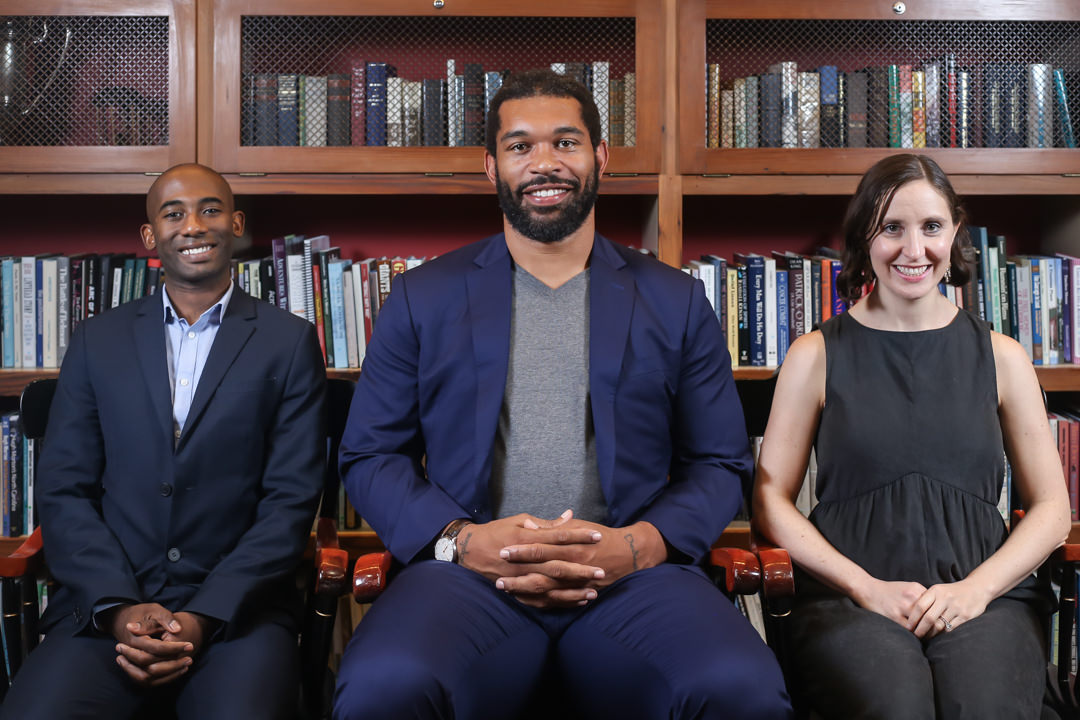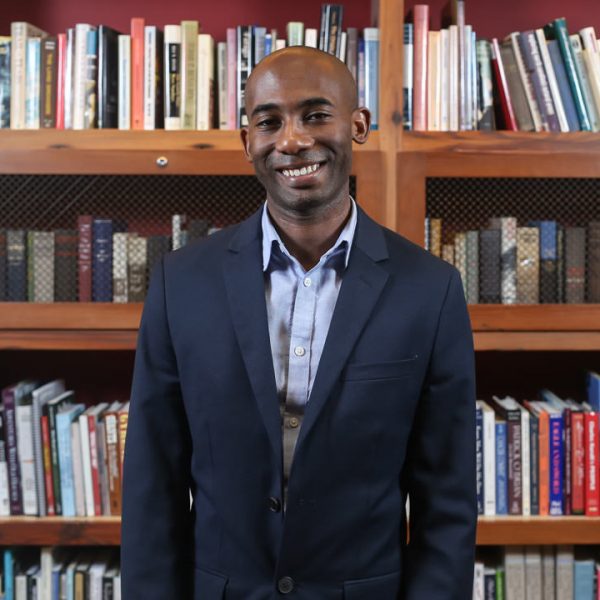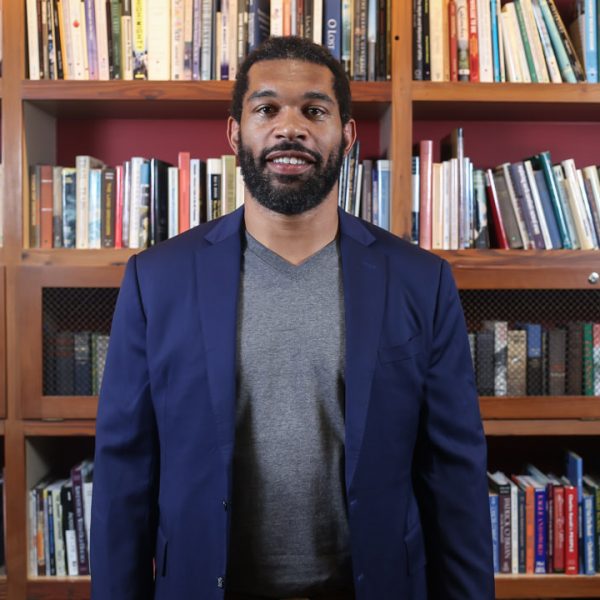GAA Honors Three Young Alumni
Posted on Sept. 27, 2019
The recipients of the GAA’s 2019 Distinguished Young Alumni Awards are, from left, Lanakila “Ku” McMahan ’07 (MPH, ’11 PhD), Julius Peppers ’02 and Emily Steel ’06. (Photos by Ray Black III)
The GAA recognized three alumni whose efforts have helped improve the lives of others with its Distinguished Young Alumni Awards on Friday. The 2019 recipients are:
- Lanakila “Ku” McMahan ’07 (MPH, ’11 PhD), of Washington, D.C., team lead for Securing Water for Food: A Grand Challenge for Development in the U.S. Global Development Lab at USAID, helping farmers in developing countries get the water they need to prosper;
- Julius Peppers ’02, of Charlotte, a star NFL defensive lineman with a history of supporting opportunities for young people; and
- Emily Steel ’06, of Brooklyn, N.Y., a Pulitzer Prize-winning reporter with The New York Times who has exposed sexual harassment and other misdeeds at media and technology companies.
The awards were presented by the GAA Board of Directors at its fall meeting. The GAA has given the awards since 1989, recognizing alumni age 40 or younger at the time of their selection for bringing credit to the University through their achievements.
Ku McMahan: Bringing Water to Where It’s Desperately Needed

Lanakila “Ku” McMahan ’07 (MPH, ’11 PhD)
McMahan helps entire populations live a better life through a combination of research and entrepreneurship. That’s what he’s done ever since he enrolled at UNC’s Gillings School of Global Public Health.
After getting his master’s, McMahan and Gillings Professor Mark Sobsey invented a water-quality test and started a company, Aquagenx. McMahan focused his career on water sanitation and hygiene and water quality. In recent years, he has turned his attention to water scarcity.
“The world is in trouble,” McMahan said. “We don’t have enough food and water. Lots of NGOs are working on it, but they don’t have access to enough capital.”
After completing his doctorate, McMahan taught research at Florida International University and oversaw the West Africa Water, Sanitation and Hygiene Program, a USAID project. He homed in on the need to grow more food with less water. In 2012, he joined Securing Water for Food, an international partnership of USAID, Sweden and the Netherlands, working with entrepreneurs from around the world who have products or techniques to increase crop yield in developing countries.
McMahan’s organization provides funding and guides startups to investors who can help them grow. He also helps improve their business models, long-term strategies and technologies. So far, the project has helped upward of 6.3 million farmers.
In the 40 or so countries he has visited, McMahan matches farmers who have had bad harvests with a technology or innovation, such as fungal armor that protects seeds from drought, a solar-powered desalination machine, a pre-spaced seed tape that includes fertilizer, a small weather station that talks to insurance companies and lowers the farmer’s rates, and irrigation hardware that boosts water efficiency by 50 percent. To date, Securing Water for Food has saved well over 10 billion liters of water.
Often such interventions double farmers’ harvests.
“That makes a real difference in their lives,” McMahan said. “It means they can get vaccines or send their kids to school or get health care or have savings.”
Julius Peppers: Hard-Hitter With Heart

Julius Peppers ’02
Peppers was a state champion track star in high school in addition to playing football and basketball. At UNC, he received the Vince Lombardi Award as the top college lineman and the Chuck Bednarik Trophy as the top collegiate defensive player. He was a unanimous pick for first-team All-America in 2001. He also played basketball as a walk-on, including in the 2000 Final Four.
Peppers was selected second in the 2002 NFL draft by the Carolina Panthers and was the Defensive Rookie of the Year. The next year, he helped the Panthers reach the Super Bowl. Peppers — who retired as a player this year and is now special assistant of business operations with the Panthers — spent 10 seasons playing for the Panthers, four for the Chicago Bears and three for the Green Bay Packers. He was named to the Pro Bowl nine times and the first and second All-Pro teams three times each.
Peppers also is known for helping others off the field.
In 2005, he sponsored some of the outreach to underserved high school students that the GAA’s Black Alumni Reunion initiated. In 2009, he donated $100,000 to BAR’s Light on the Hill Society Scholarship that supports students of color. He contributed another $250,000 in 2012. Peppers Scholars — 18 so far — have gone on to medical school, law school, doctoral programs and careers with nonprofits and in international relations.
Peppers has worked with Big Brothers Big Sisters and assisted churches, such as buying a van to transport youths to activities and enable people without transportation to attend worship services. He sponsored Rites of Passage, a program in North Carolina to make sure boys had interactions with accomplished men of color who served as role models.
In 2018, after Hurricane Florence barreled through his native eastern North Carolina, he launched a relief fund with $100,000 and joined volunteers in Robeson County to serve meals.
“The problems don’t leave just because the cameras did,” Peppers said. “When you see someone in a time of need, I feel like it’s a responsibility and you have an obligation to try to help if you’re in a position to help.”
Emily Steel: Bringing Light to Dark Places

Emily C. Steel ’06
Steel keeps a sign on her desk at The New York Times that reads: What good shall I do today?
That has been her guiding principle since she was a journalism major at UNC working for The Daily Tar Heel. She went on to intern for the St. Petersburg Times and as a feature writer in China for the English-language Shanghai Daily.
Steel’s first job out of college was as a reporter for The Wall Street Journal, where she won awards for her investigative pieces, including exposing pervasive online tracking and Facebook’s privacy breach, and was a finalist for a Pulitzer Prize.
Steel moved to the Financial Times before being hired in 2014 by The New York Times to cover media. Her investigations included Fox News host Bill O’Reilly’s exaggerated claims of on-the-ground coverage of the Falklands War when he actually was in Buenos Aires.
Steel and Times reporter Michael Schmidt also investigated multimillion-dollar settlements O’Reilly had made to female employees to settle sexual harassment claims, leading to his resignation. Her investigation into Vice Media found settlements involving allegations of sexual harassment or defamation and dozens of women who said they had experienced or witnessed sexual misconduct at the company. Steel shared in a Times Pulitzer for public service in 2018 for its broad reporting on sexual harassment and misconduct across industries.
Steel also has received the Gerald Loeb Award for Online Enterprise and the Sigma Delta Chi Public Service Award (both for her work at the WSJ), the Livingston Award for the best young talent in journalism, the Pen Center USA Freedom to Write Award and the inaugural Matrix Incite Award from New York Women in Communications. Vanity Fair inducted her into its Hall of Fame in 2017.
Most recently, Steel spent several months in Hong Kong as protests intensified over an extradition bill. When she returned, she also covered the Christchurch mosque massacre in New Zealand and new developments in sex trafficking charges against financier Jeffrey Epstein.
